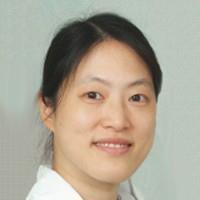-
About
- Leadership & Faculty
- News & Events
-
Admissions
-
Academics
- Graduate
- Advanced Clinical Training
- Continuing Education
- Academic Departments
- Academic Offices
- Simulation Experiences
-
Student Life
- Offices
-
Research
-
- Transformative Research
- Centers & Shared Resources
-
-
Hospitals & Clinics
- Emergency Care
- Hospital Services
-
Community Outreach
- Volunteer

Vicky Yang
D.V.M., Ph.D., DACVIM (Cardiology)

Research/Areas of Interest
Canine chronic valvular disease; biomarkers for cardiovascular diseases; therapeutic and diagnostic potentials of microRNA in cardiovascular disease; cardio-oncology; epigenetics of feline and canine heart diseases; translational animal models
Education
- Doctor of Vet Medicine, Tufts-Cummings School of VM, USA, 2009
- Doctor of Philosophy, Massachusetts Institute of Technology, USA, 2002
- S.B., Massachusetts Institute of Technology, USA, 1997
Biography
As a veterinary cardiologist and a researcher in the field of regenerative medicine, Dr. Vicky Yang has a special interest in improving our understanding of the role of epigenetics in canine cardiac disease and the potential therapeutic benefits of regenerative medicine treatments for these diseases. These treatments would include the use of stem cells, exosomes, and microRNAs. Dr. Yang and her laboratory team are also interested in developing "liquid biopsies" for canine heart diseases using plasma exosomal microRNA. Given the similarities between companion animal and human heart diseases, our patients can serve as excellent spontaneous disease models for human cardiac diseases, including heart valve diseases, cardiomyopathies, and arrhythmias. The knowledge acquired through our veterinary patients can therefore improve our understanding of human heart diseases. Since joining the Regenerative Medicine Laboratory (RML) at Tufts Cummings School of Medicine in 2013, Dr. Yang and the RML team have developed the technique for canine mitral valve valvular interstitial cell isolation and culture, and cell, whole cardiac tissue, and plasma exosomal microRNA analysis protocols.
Dr. Vicky Yang also treats heart conditions in dogs, cats, and other animals at the Foster Hospital for Small Animals. Given Dr. Yang's duel role as a clinical veterinary cardiologist and basic research scientist, she provides a unique role in bridging the clinical needs with basic science research objectives.
Dr. Vicky Yang also treats heart conditions in dogs, cats, and other animals at the Foster Hospital for Small Animals. Given Dr. Yang's duel role as a clinical veterinary cardiologist and basic research scientist, she provides a unique role in bridging the clinical needs with basic science research objectives.